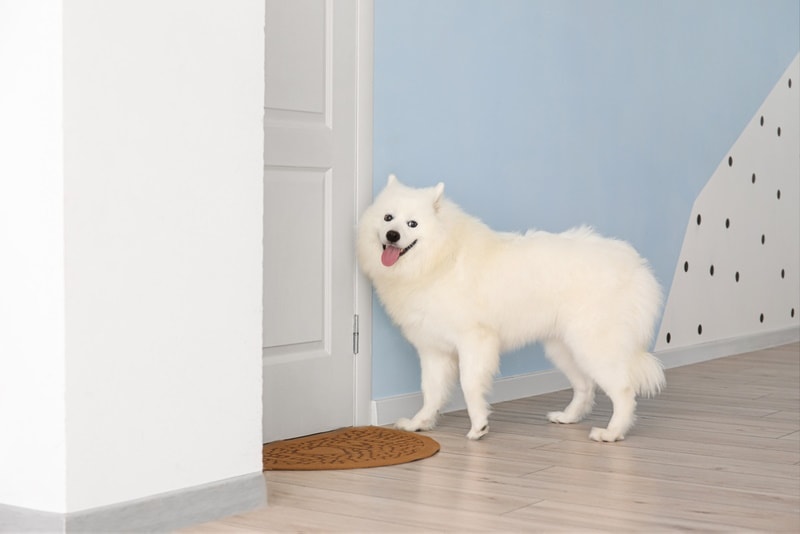
Click to Skip Ahead
If you’re searching for a furry friend who’s loyal, intelligent, and friendly, then the Samoyed might be the perfect choice. Not only are they great workers, but their super cute appearance and happy smile can win over anyone’s heart. They are a true delight to have around. However, gaining knowledge about this incredible breed is essential before you welcome one into your home.
You may be wondering how many years you can expect to spend with your new furry friend. Our pets will quickly become a beloved part of our family, and we want to ensure they stay with us as long as possible. This article will give you all the answers!

Samoyed Average Lifespan
In general, Samoyeds can live up to 12 or even 14 years. And it is believed that some of these fantastic dogs have even exceeded that age! Of course, the lifespan of a canine can vary based on activity levels, size, and possible health issues. Every dog is unique in their own way.
While you can’t control everything about your Samoyed, you can take good care of them to give them the best chance to live to a ripe old age. And what’s even more incredible is that many Samoyed owners have reported that these pets stayed active and lively until their very last day!

How to Care for Your Samoyed for a Long Lifespan?
Feeding & Diet
As a dog owner, you want to ensure your furry friend stays in tip-top shape. One way to do that is through their diet and nutrition. While there isn’t a set rule on what to feed your dog or how often your dog should eat, there are recommendations that can help. A well-balanced, good-quality, complete dog food is recommended, and it is important to change your dog’s diet depending on its age. Puppy diets will have a different formulation to adult dog food. Feeding an adult dog 1-2 times a day is a great starting point. It’s essential to pay attention to portion sizes. The right amount can vary depending on your Samoyed’s size, health conditions, and age.
It can be tricky to figure out, but your veterinarian can help you determine what’s best for your pup. By working together, you can ensure your dog gets the nutrition they need to stay healthy.
Environment
Did you know a dog’s living environment can significantly impact their health and well-being? Studies have shown that even after considering factors like age and weight, dogs with more social companionship tend to be healthier. In addition, you can give your pup the peace of mind they need to relax and thrive by eliminating hazards and ensuring a secure environment.
Remember, your dog relies on you to keep them out of harm’s way, so take action today and create an environment they can truly call home.

Care
Providing your furry companion with proper care is crucial to ensure their well-being. Besides sufficient food and exercise, routine veterinary care is necessary to keep them healthy. This includes administering vaccinations, controlling parasites, and dental care. Grooming is also an essential aspect of their care, and it helps maintain their overall hygiene.
Grooming
Breeding
It’s usually best to wait until your female is around 2 years old before considering breeding. This is because most Samoyeds are large dogs and have fully developed by this point, reducing the risk of complications. Before trying to breed a Samoyed, you should have its hips assessed by x-ray (radiographed), a full ophthalmic (eye) examination carried out by an eye specialist, and genetic tests to include X-linked progressive retinal atrophy, X-linked hereditary nephritis and Oculoskeletal Dysplasia. The other dog that you plan to breed your dog with should have all of the above tests carried out also to ensure healthy and happy puppies are produced.
Healthcare
Taking care of our furry friends is a top priority, and regular veterinary check-ups are crucial to ensuring their health and happiness. As your canine ages, double up on their annual visits. We all want our pups to stick around for as long as possible and being proactive about their health is vital to achieving this goal. So, let’s ensure we’re giving our senior dogs the extra TLC they deserve! It is also recommended to take out an insurance policy for your puppy as soon as you get it home. Make sure this gives you life-long cover and that the excess is affordable.

The Life Stages of a Samoyed
As dog owners, we all want to know what to expect from our furry friends as they grow and mature. That’s why we need to understand the four stages of a dog’s life cycle: puppy, adolescent, adult, and senior. Let’s take a closer look at each stage, so you can prepare for what’s to come.
Puppy
When puppies are born, they’re deaf, blind, and can’t even regulate their own body temperature, but grow rapidly in the first 2 months. The puppy stage lasts until they’re between 6 and 9 months old. It’s amazing to think about how much they grow and develop during this time.

Adolescent
This stage lasts from 6 to 18 months of age. It’s essential to train your adolescent dog using gentle and consistent methods to prevent any behavioral issues from popping up. Keep your pup on the right track! Samoyeds are bright and active dogs with lots of energy. They will need to be stimulated by training, socializing and playing.
Adulthood
As Samoyeds reach adulthood, typically at about 18 months old, they become more manageable due to their earlier training. This is an exciting time to discover new activities you and your furry companion can enjoy together, such as agility classes or hiking in the hills.
Senior
Generally, a dog’s golden years begin between 7 and 10, with larger breeds aging faster. Cherishing each moment with our furry companions is essential, especially as they enter their senior years.


How to Tell Your Samoyed’s Age
One of the most reliable ways to determine a dog’s age is by looking at their teeth. If a puppy is younger than 4 weeks old, they won’t have any teeth at all. But if they’re between 4 and 8 weeks old, they’ll have temporary (deciduous) teeth as sharp as needles.
As your furry companion grows older, their pearly whites may start to lose their shine. You may notice some yellowing and plaque build-up when they are about 3 years old. When they reach age 5, look for tartar, less sharp teeth, and an increased risk of dental issues. When they hit double digits, your dog may experience cracked, loose, or even missing teeth. Dental aging, however, is not very reliable and, at best, gives a rough estimate of age.

Conclusion
To ensure your Samoyed lives a long and happy life, give them a well-balanced diet, plenty of exercise, a loving home and veterinary attention when they need it. With your help, your furry friend’s lifespan might exceed your expectations—up to 15 years in some cases. Remember, caring for them is a rewarding responsibility that will pay off in more ways than one.
Featured Image Credit: Sofia Dudova, Shutterstock







